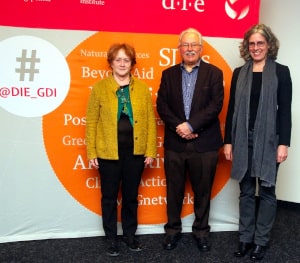
A global boom in dam building is unfolding as more than 3,700 large dams are planned or under construction worldwide. They are to service growing demands for energy, irrigation, urban water or flood control. This new generation of dam schemes, most of them in ‘developing countries’, has the potential to make a significant contribution towards achieving economic growth, the UN Sustainable Development Goals (SDGs) and commitments made by the Paris Agreement on Climate Change. But, maximising the benefits of dams – while minimising the negative social and environmental impacts – remains a great challenge.
In his presentation, Professor David Hulme from the Global Development Institute at the University of Manchester presented insights from the FutureDAMS research project. He reflected on whether current dams learn from past experience, or whether ‘not learning from experience’ remains a central feature. Ines Dombrowsky, Head of Programme on Environmental Governance at the German Development Institute / Deutsches Institut für Entwicklungspolitik (DIE), moderated a lively discussion that touched on large dams under construction in Africa and Asia, possible global legal frameworks and tensions between modernisation and climate change. Waltina Scheumann, associate researcher at DIE, added insights from her research on social and environmental norms in dam construction in emerging economies.
The Bonn Water Lecture series is jointly organised by the Center for Development Research of the University of Bonn (ZEF), the United Nations Convention on Combat Desertification (UNCCD), the GermanDevelopment Institute / Deutsches Institut für Entwicklungspolitik (DIE), and the Eco-Hydrology and Water Resources Management Department of Geography, University of Bonn.
An overview on DIE’s water expertise is available here.
Schreibe einen Kommentar